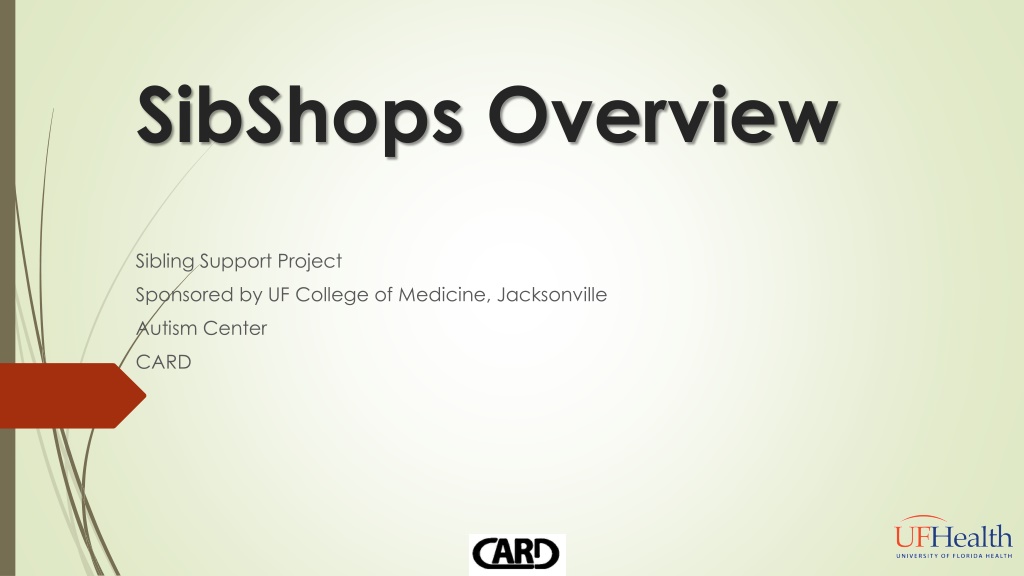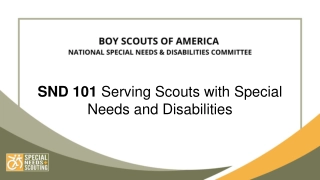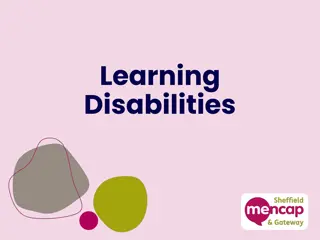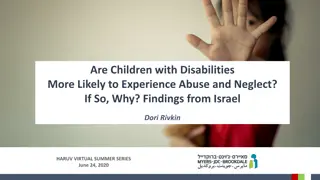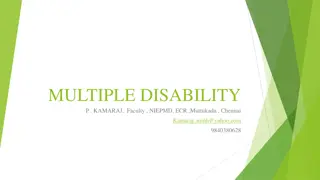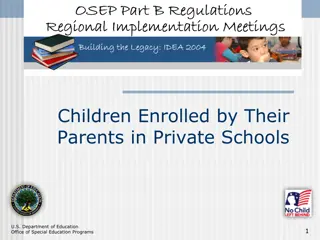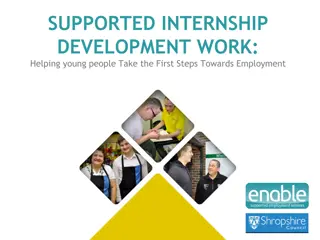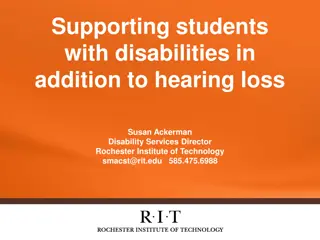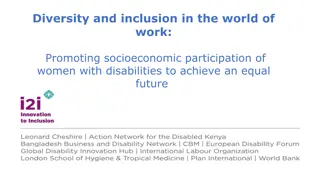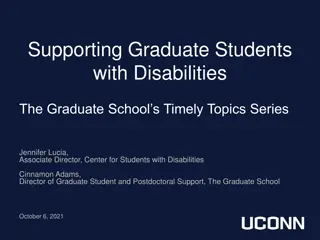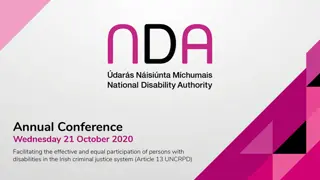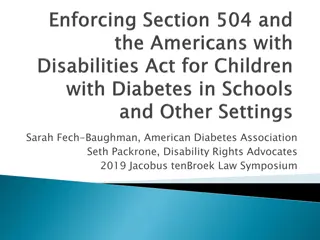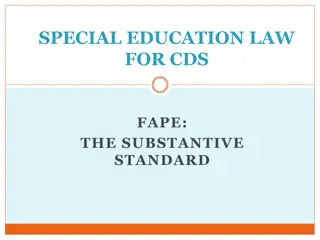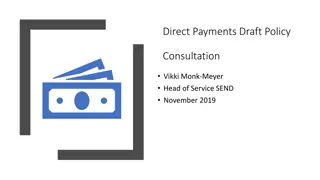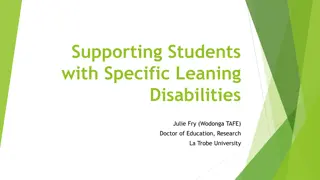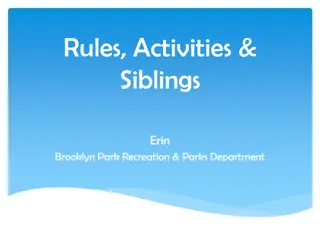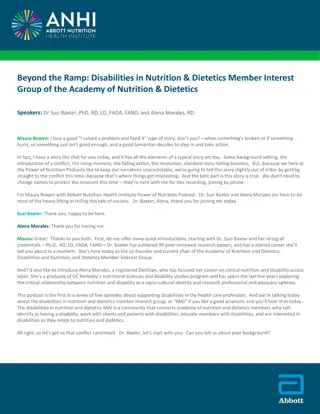Understanding SibShops: Supporting Siblings of Children with Disabilities
SibShops, sponsored by UF College of Medicine, Jacksonville Autism Center CARD, provides peer support and education programs for school-age siblings of children with disabilities. Families gain insights into the unique challenges siblings face, showcasing the importance of these workshops in fostering long-lasting relationships and offering siblings the opportunity to share experiences in a supportive environment.
Download Presentation

Please find below an Image/Link to download the presentation.
The content on the website is provided AS IS for your information and personal use only. It may not be sold, licensed, or shared on other websites without obtaining consent from the author. Download presentation by click this link. If you encounter any issues during the download, it is possible that the publisher has removed the file from their server.
E N D
Presentation Transcript
SibShops Overview Sibling Support Project Sponsored by UF College of Medicine, Jacksonville Autism Center CARD
What Are SibShops? TAKE AWAY: 1. Families will obtain an understanding of what SibShops have to offer for the family member who will have the longest-lasting relationship with a person who has a disability 2. Families will find out how to register for upcoming SibShops in St Johns County. 9/19/2024
What Are SibShops? For the adults and agencies that sponsor SibShops SibShops are evidence of their loving concern for the family member who will have the longest-lasting relationship with a person who has a disability. 9/19/2024
Why Sponsor SibShop? More than 6,000,000 siblings of children with disabilities in the U.S. Siblings frequently have the worst deal Asked to be too independent too soon Asked to be a primary caretaker Miss out on childhood experiences (Scouts, sports, sleepovers) Expected to be the lifelong caregiver 9/19/2024
Why Sponsor SibShop? The patient is never the child with the disability- it is the entire family 9/19/2024
Why Sponsor SibShop? Look for the 15 minute date. Unscheduled- not really 9/19/2024
What Are SibShops? For the adults and agencies that sponsor SibShops Opportunities for brothers and sisters of children with special needs to obtain peer support and education within a recreational context Reflect an agency s commitment to the family members in developing long-lasting relationships with the person with special needs 9/19/2024
What Are SibShops? They're peer support and education programs For school-age brothers and sisters. A forum where they can talk about their lives 9/19/2024
What Are SibShops? For the kids who attend them, SibShops are pedal-to-the- metal events where they will meet other sibs (usually for the first time) have fun, laugh, talk about the good and not-so-good parts of having a sib with special needs play some great games, learn something about the services their brothers and sister receive, and have some more fun. 9/19/2024
What Are SibShops? For the young people who attend them, they are events, which are Lively Energetic Loving 9/19/2024
Are SibShops A Form of Therapy? SibShops are events! Not therapy Effects may be therapeutic (bonus) The SibShop model takes a wellness perspective. They re a celebration of the many lifelong contributions made by brothers and sisters of people with special health and developmental needs. 9/19/2024
What Are SibShops? An NPR piece with Neal Conan and Talk of the Nation from September 2012 on SibShop, with Don Meyer, the SibShops developer. http://www.npr.org/2012/09/25/161754564/siblings-with-special-needs- change-childhood 9/19/2024
Are SibShops A Form of Therapy? SibShops Reflect a belief that brothers and sisters have much to offer Intersperse information and discussion activities with Games Crafts Unique activities Provide opportunities for peer support Include guest speakers from time-to-time 9/19/2024
Are SibShops A Form of Therapy? Trained Facilitator always keeps an eye open for children who need further assistance Refer children to additional resources in the community 9/19/2024
Who Attends SibShops? Siblings! Most siblings are siblings of children with developmental disabilities Come from diverse backgrounds Originally developed for siblings 8 13 yrs. Adapted to include: Slightly younger children and slightly older teens Children with other medical conditions (e.g. cancer, other health impairments, and mental health) Children with parents who have special health conditions 9/19/2024
Who Sponsors SibShops? School districts Agencies (e.g. UF Jacksonville Autism Center, Easter Seals, developmental disabilities councils, chapters of the Arc, Autism Society) Children s hospitals Intervention centers Park and recreation programs Churches Any collaborative organization 9/19/2024
Who Facilitates and Who Assists? Run by a team Service providers CARD Clinician Teacher/special education teacher Social worker Speech and Language or Occupational Therapists Nurse, etc. Family members 9/19/2024
Who Facilitates and Who Assists? Suggested: Service providers lead meetings Knowledge about special needs populations Know resources in the community Parents support the efforts 9/19/2024
Parents Parents are often the driving force in getting a SibShop started, but they are not usually the best people to run the SibShops their own children attend. There is plenty of behind-the-scenes work for parents to do to support a SibShop effort. 9/19/2024
Facilitators The facilitator who is a service provider will know about the special needs represented in the group and about services available in the community. We very much like having adult sibs as SibShop facilitators--and adult sibs tell us that they get much out of running the program. 9/19/2024
Facilitators Regardless of whether the facilitator is a family member or service provider, we seek certain qualities in a good SibShop facilitator. We want them to truly enjoy the company of kids Have had experience working with kids Be especially good listeners Have the ability to convey a sense of joy, wonder, and fun. 9/19/2024
Qualities of A SibShop Facilitator Must be trained*** SibShops training Must have experience working with children Enjoy the company of children Be able to play games, sing songs, express joy, and be curious, Be a good listener Have a sense of humor Be respectful of all participants 9/19/2024
What Is The Optimal Number for A SibShop? Ideally, 12 - 20 children Less than 12 children? Can have 5 children and still be successful! 9/19/2024
When Are SibShops Offered? After school Early release day Teacher planning/work days Saturday s Time: Want to have ample time for: information sharing activities, discussions, games, songs, crafts, and food/snacks 9/19/2024
What Are the Goals of the SibShop Model? Provide siblings of children with special needs opportunities To meet other siblings in a relaxed, recreational setting Reducing the feeling of isolation Promoting informal sharing and friendships To discuss common feelings, concerns, and joys To learn from each other and how to handle situations commonly experienced/shared by siblings of children with special needs To learn more about their siblings disability and how it impacts their lives To share what s learned with others 9/19/2024
What Are the Goals of the SibShop Model? Provides parents and other professionals an opportunity to learn more about the concerns, views, and visions frequently experienced by siblings of children with special needs 9/19/2024
Are There Any Guarantees? Parent Assurance When a parent sends their child(ren) to a SibShop, they are sending them to a program that is true to the spirit and goals of the SibShop model Child Assurance Good time SibShop Trademark The program must be registered in order for a SibShop to call itself a SibShop 9/19/2024
How Often Are SibShops Held? Frequency depends on needs and resources! SibShops can operate as a club Weekly Bimonthly SibShops can operate as a class Example: 5 SibShops, meeting once a month, registration. Encourages same participants 9/19/2024
Resources Sibling Support Project Website. https://siblingsupport.org/SibShops 9/19/2024
"I can t imagine having a plain old sister," writes ten-year-old Ryan Clearwater. He is one of 45 siblings in Views from Our Shoes who share their experience as the brother or sister of someone with a disability. The kids whose essays are featured range in age from four to eighteen and are the siblings of youngsters with a variety of special needs including autism, cerebral palsy, developmental delays, chronic health conditions, attention deficit disorder, hydrocephalus, visual and hearing impairments, Down syndrome, Prader-Willi and Tourette's syndrome. Their personal tales introduce young siblings to others like them, perhaps for the first time, and allow them to compare experiences. A glossary of disabilities provides easy-to- understand definitions of many of the conditions covered. 9/19/2024
Give teenagers a chance to say whats on their minds, and you might be surprised by what you hear from a group of 80 teenagers, from all over the United States and abroad, to talk about what it s like to have a brother or sister with special needs. Their unedited words are found in The Sibling Slam Book, an honest, non-PC look at the lives, experiences, and opinions of siblings without disabilities. Formatted like the slam books passed around in many junior high and high schools, this one poses a series of 50 personal questions along the lines of: What should we know about you? What do you tell your friends about your sib s disability? What s the weirdest question you have ever been asked about your sib? If you could change one thing about your sib (or your sib s disability) what would it be? What annoys you most about how people treat your sib? 9/19/2024
Living with a Brother or Sister with Special Needs focuses on the intensity of emotions that brothers and sisters experience when they have a sibling with special needs, and the hard questions they ask: What caused my sibling's disability? Could my own child have a disability as well? What will happen to my brother or sister if my parents die? Written for young readers, the book discusses specific disabilities in easy to understand terms. It talks about the good and not-so-good parts of having a brother or sister who has special needs, and offers suggestions for how to make life easier for everyone in the family. The book is a wonderful resource, not just for siblings and their parents but also for teachers and other professionals who work with children with special needs. This revised and updated edition includes new sections on attention deficit hyperactivity disorder, fetal alcohol syndrome, fragile X syndrome, traumatic brain injuries, ultrasound, speech therapy, recent legislation on disabilities, and an extensive bibliography. 9/19/2024
When Are SibShops Offered? St. Johns County currently planned 9:00 AM 12:00 PM Friday - February 17, 2017 Palencia Elementary School Monday - March 20, 2017 Fullerwood Training Center 9/19/2024
How To Register? Registration is required Want to reserve a spot There are 12 spots available http://stjohnssibshops.eventbrite.com 9/19/2024
